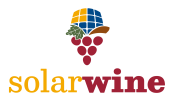
MYCOWINE Operational Group: An innovative project for the use of mycorrhizal fungi in the production of high-value wine in wineries in Castilla y León and La Rioja, in a climate change scenario.
- Type Operational group
- Status In progress
- Execution 2024 -2027
- Assigned Budget 595.003,19 €
- Scope Supraautonómico
- Autonomous community Castilla y León; Madrid, Comunidad de
- Main source of financing CAP 2023-2027
- Project website GO MYCOWINE
The Spanish wine sector enjoys a prominent global position, being the world leader in vineyard surface area, the third largest producer and the leading exporter in volume, with wine being an extremely important product in the Spanish rural economy. However, as drought and temperatures increase, many of the producing areas are suffering a process of soil loss and are at risk of desertification. In addition, the use of chemical fertilizers and phytosanitary products has worsened the biodiversity and biology of the soil.
In order to combat the effects of climate change, organic farming and regenerative viticulture have become an alternative to regenerate soils in recent years. Consequently, the MYCOWINE project is aimed at improving and enhancing the quality of wine and the resources that make its production possible.
The MYCOWINE project aims to innovate in vineyard nutrition to obtain, on the one hand, a higher-quality product (grapes and wine) and, on the other, more biodiverse soils with greater resilience to the impacts of climate change. This results in new products that provide added value to consumers from a sensory and commercial perspective, in line with the sustainability and circular economy transition objectives established in European and national policies.
- Development of a practical manual on sustainable vineyard management, which will serve as a reference for implementing management techniques that promote sustainable management of soil biodiversity and as a training tool for professionals.
- Conducting a study of the diverse soil biodiversity in different geographical wine-growing areas. The participating wineries are strategically located in four of the most important designations of origin in Spain: DO Toro (Bodegas Fariña), DO Rueda (Grupo Yllera), DO Ribera del Duero (Bodega Matarromera, Pago de Carraovejas, and Pradorey), and DO Rioja (Bodegas Bilbaínas).
- Development of specific biofertilizers based on local mycorrhizal fungi and bacteria, which could be patented; and the creation of a sustainable soil management seal for use in viticulture.
- Creation of a previously nonexistent Sustainable Vineyard Management system whose purpose is to certify and help wineries differentiate themselves and add value to their products based on their efforts in environmental sustainability.
- Design and development of a training program for sustainable soil management, aimed at the technical staff of participating wineries.
Through the development of a rigorous results transfer and dissemination plan, the project will be recognized and recognized nationally and will highlight the significant commitment the wine industry is making to promoting innovation to improve its sustainability and competitiveness, as well as the quality of its products.
The Spanish wine sector enjoys a prominent global position, leading the world in vineyard area, the third largest producer, and the largest exporter by volume, making it an enormously important product for the Spanish rural economy. However, as drought and temperatures increase, many of the producing areas are experiencing soil loss and are at risk of desertification. Additionally, the use of chemical fertilizers and phytosanitary products has worsened biodiversity and soil biology.
Furthermore, the Iberian Peninsula lies on the border between the Atlantic climate and the desert climate of North Africa, where the risk for Mediterranean crops such as vines is very high. To combat the effects of climate change, organic farming and regenerative viticulture have emerged as an alternative for soil regeneration in recent years. It's worth noting that sustainability is one of the major drivers driving innovation in the food industry today, and the wine market, highly competitive in terms of quantity and quality, is no exception to this macrotrend.
The MYCOWINE project aims to innovate in vineyard nutrition to obtain, on the one hand, a higher-quality product (grapes and wine) and, on the other, more biodiverse soils with greater resilience to the impacts of climate change. This results in new products that provide added value to consumers from a sensory and commercial perspective, in line with the sustainability and circular economy transition objectives established in European and national policies.
MYCOWINE aims to generate new biological tools to obtain higher-quality wines, enhancing biodiversity and increasing vineyard resilience to external factors. It seeks differentiation through the production of high-quality, sustainable wines, focusing on soils and how proper management of this resource (terroir) unique to each winery results in higher-quality, more complex grapes and a final product with high added value.
A reference manual will be available for implementing sustainable vineyard management models, focused on preserving soil microbiological biodiversity, which will lay the foundation for the design of a professional training program. Furthermore, the physicochemical and microbiological characterization of soils in different geographical areas will allow for the development of preventive strategies against external factors that could compromise grape productivity and quality.
The goal is to create a patentable, globally marketable biofertilizer adapted to local environmental conditions. This will reduce the need for pesticide applications in vineyards and increase soil microbial biodiversity, resulting in soils that are more resilient to the impacts of climate change and produce higher-quality wine.
In addition, wineries and vineyards that meet specific standards of sustainable agricultural practices will be given added value through the creation of a new Sustainable Management Seal that will promote access to environmentally conscious markets.
- Coordinator/entity name: CASTILLA Y LEÓN FOOD INDUSTRY ASSOCIATION VITARTIS
- Postal address: Calle Valle de Arán 9, N02, Offices M22 and M23, 47010, Valladolid
- Coordinator/entity email: director@vitartis.es
- Telephone: 983024442
Practical Manual on Sustainable Viticulture and/or Mycoviticulture. The Manual will provide field technicians and winegrowers with a permanent reference, with detailed instructions based on scientific knowledge and shared experiences, to use when implementing sustainable management models to preserve the biodiversity of their farms, obtaining a higher-quality product. It will also serve as an educational resource for training new workers and students in sustainable practices and will foster innovation and continuous improvement by acting as a starting point for new research and technological developments for sustainable vineyard management. Furthermore, implementing the recommendations will lead to a reduction in the use of fertilizers, pesticides, and/or insecticides, which not only benefits the environment by promoting healthier and less polluted soils and ecosystems, but also has significant economic advantages by reducing operating costs and attracting new consumers concerned about environmental sustainability. Physicochemical and microbiological characterization of the soil in different vineyard plots. Understanding the quantity and diversity of microorganisms living in the soil, known as "microbial terroir," allows us to understand the health of a vineyard and its degree of differentiation from surrounding vineyards. This information will help participating wineries design sustainable management models based on biological tools and will facilitate decision-making regarding the most appropriate viticultural and oenological practices based on the microbial potential of the grapes and the style of wine to be produced.
Furthermore, it will allow preventive action against external factors that could compromise wine production and quality, minimizing the risk of production losses, as well as efficiently managing resources (fertilizers and other agricultural inputs), reducing the costs associated with their purchase and application. This characterization will also allow us to understand the frequency and distribution of these microorganisms in different geographic areas and the common factors that influence their composition. Isolation and purification of mycorrhizal fungi and local bacteria capable of generating a specific biofertilizer to improve wine quality. The large-scale production of mycorrhizal fungi will provide a biological tool, marketable globally, to combat the effects of climate change and increase the resilience of wine crops. This procedure is adaptable and scalable to other geographic areas, allowing for more sustainable agricultural development while producing high-quality grapes for producing wines of high complexity, quality, and market value. Creation of a Sustainable Management Seal for vineyard soils. This seal, which was previously nonexistent, will certify that a winery or vineyard meets specific standards for sustainable agricultural practices, increasing credibility with consumers, distributors, and international markets by demonstrating a commitment to environmental conservation, biodiversity, and the responsible use of resources. It also provides added value to products in a highly competitive market, strengthening the brand's reputation as a leader in responsible agricultural practices and potentially achieving higher sales margins. Design and development of a training program for sustainable soil management.
The program will directly benefit participating wineries, which will have highly qualified personnel trained in sustainable soil management practices, ensuring the continuity of the knowledge acquired over time. At the same time, it provides significant value to the wine sector by providing specialized knowledge that can be applied by any winery interested in improving the sustainability and quality of its vineyards. It will also enable the development of new technological applications to increase agricultural productivity. The program will register and protect the winery's own microorganisms as an intangible asset for the project partners. The final result will be a biofertilizer product specific to each soil type and location, optimally adapted to local environmental conditions, which can be registered internationally with the CECT. Its application will contribute to the sustainability of the vineyards and their resilience in the context of climate change, and will provide added value for each winery by improving vine productivity (greater plant vigor) and the quality of the grapes and the final product: the wine. These biofertilizer products are also a sustainable use of a high-potential natural resource: soil microorganisms. Their production is 100% sustainable, as they generate no waste.
Dissemination results. The MYCOWINE project's dissemination plan will contribute to strengthening the wine and agri-food sector as a whole by communicating its values to society as an essential sector made up of sustainable, competitive, and responsible businesses. It will foster greater awareness and education about sustainable agricultural practices and highlight the importance of preserving soil biodiversity, educating industry professionals and the general public about the benefits of sustainable viticulture. Furthermore, by transferring the results to stakeholders in the science and research system (universities, R&D centers, technology platforms, etc.), it will promote ongoing research and development, driving innovation in the agri-food sector.
- ASOCIACIÓN DE LA INDUSTRIA ALIMENTARIA DE CASTILLA Y LEÓN VITARTIS
- ASOCIACIÓN DE LA INDUSTRIA ALIMENTARIA DE CASTILLA Y LEÓN VITARTIS
- BIOTECNOLOGÍA FORESTAL APLICADA, S.L.
- BODEGAS BILBAÍNAS, S.A.
- PAGO DE CARRAOVEJAS, S.L.U.
- BODEGAS FARIÑA, S.L.
- BODEGA MATARROMERA, S.L.
- REAL SITIO DE VENTOSILLA, S.A.
- BODEGAS GRUPO YLLERA, S.L.





